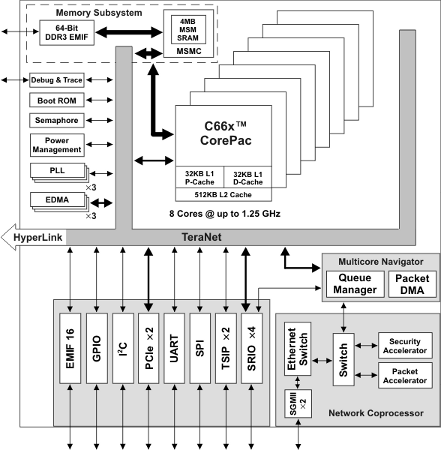TI updates DSP line with new chips, Linux support
Apr 25, 2011 — by Eric Brown — from the LinuxDevices Archive — 10 viewsTexas Instruments (TI) announced a new single-core TMS320C6671 member of its multicore TMS320C66x digital signal processor (DSP) family, as well as enhancements to its TMS320C6670 radio system-on-chip (SoC). In addition, the company released a free multicore software development kit (MCSDK) update for its C66x DSPs featuring updated Linux kernel support, optimized DSP libraries, and support for the OpenMP programming model.
TI announced its TMS320C66x family of DSPs in November, along with Linux development support and a claim of the devices' being the industry' first DSPs to support native fixed- and floating-point operations. The C66x DSPs include a dual-core C6672, a quad-core C6674, a quad-core C6670 SoC with extra networking coprocessors for radio communications, and an eight-core, 1.2GHz TMS320C6678, which is claimed to be the industry's fastest DSP (see farther below for more details).
These SoCs now appear to be generally available and are offered with a free, updated Linux-ready development environment. TI has also announced a single-core member of the family with its TMS320C6671, as well as an updated version of the TMS320C6670 radio SoC.

Eight-core C6678 block diagram
(Click to enlarge)
The device is pin- and software-compatible with the other C66X DSPs, and is designed for public safety and defense, medical and high-end imaging, test and automation, high-performance computing, and core networking applications, says the company.
C6671 features are said to include 64-Bit DDR3 interface, four lanes of Serial RapidIO (SRIO), two lanes of PCI Express, and an Ethernet MAC subsystem. Additional interfaces include UART, I2C, GPIO, SPI, and dual TSIPs (telecom serial ports), says TI.
TI's previously announced quad-core, 1.2GHz C6670 radio communications SoC is targeted at software-defined radio (SDR) development. The new version adds a multistandard Bit Rate Coprocessor (BCP), plus other new coprocessors that accelerate physical layer processing for LTE, WCDMA, TD-SCDMA, and WiMAX, says TI. The coprocessors substantially increase system capacity and performance with low latency, claims the company.
Linux-ready multicore kit offers OpenMP API
TI announced the free multicore software developer's kit (MCSDK) at the C66X launch in November. At the time, the company said it would offer Linux development support and a suite of multicore tools and libraries, but offered few details. Now TI says the updated kit will offer the OpenMP Application Program Interface (API), making the C66x DSP family the first multicore devices to support the standard. OpenMP is a well-established portable, scalable programming model for developing parallel applications in mission critical applications.
TI's updated MCSDK also provides validated and optimized drivers integrated with SYS/BIOS, a real time operating system (RTOS), and Linux support, with appropriate demonstration examples, says the company. It ships with optimized DSP libraries (DSPLIB) and image processing libraries (IMGLIB), which will be updated within the year with additional kernels. TI will also add optimized libraries for vision analysis, cryptography, voice, and fax, says TI.
In addition, as previously reported, evaluation modules (EVMs) are available from TI for the TMS320C6670 or the TMS320C6678 processor, known as the TMDXEVM6670L or TMDXEVM6678L EVMs, respectively. Both include a free MCSDK, Code Composer Studio software, and a suite of application/demo codes, says TI.
C66X background
Each of TI's C66x processors is built with multiple 1.0GHz or 1.25GHz DSP cores. By comparison, the earlier C64x DSPs range from three or six cores, and whereas the tri-core C64X devices range up to 1.2GHz, the six-core models top out at 700MHz each.
While the C64x processor cores are built on a third-generation VelociTI very-long-instruction-word (VLIW) architecture, the C66x DSPs move up to TI's new KeyStone multicore architecture. KeyStone is easier to use than VelociTI, and maximizes the throughput of on-chip data flows, eliminating the possibility of bottlenecks, claims TI.
The architecture offers a "Multicore Navigator" claimed to enable direct communication between cores and memory access. It also provides an enhanced memory architecture and a Hyperlink interface, while supporting PCI Express (PCIe) Gen 2, SRIO, and additional peripherals, says the company.
The C66X processors offer packet and security network accelerators, as well as varying amounts of L1 and L2 SRAM. All the devices are said to support 64-bit DDR3 memory and 64-channel EDMA.
In addition to supporting PCIe and Serial RapidIO lanes, the processors provide gigabit Ethernet, TSIP, UART, i2C, SPI, and GPIO interfaces. The C66x line of DSPs is claimed to draw 0.9 V to 1.1 V, with power-saving features supplied by TI's SmartReflex technology.
TI has been making a major push to open up its DSP architectures to ARM Linux developers. These efforts include the release of two free Linux development tools to ease programming of the TMS320C6000 DSP.
With TI's Linux port to the C66x DSPs, system designers have been able to start implementing DSP cores directly with Linux, without requiring a SoC that also includes an ARM core, such as the TMS320DM8168, the DaVinci DM3730, and other selected TI OMAP, Sitara, and DaVinci SoCs. TI is not claiming the process is as easy or as comprehensive as working with an ARM processor, but at least it's a feasible alternative for developers who are focusing on signal processing applications.
Stated Larry Meadows, CEO of the OpenMP ARB, "TI's support of the OpenMP API is an important win for developers in the embedded processing space and showcases the importance of the OpenMP API at all levels of computing, from embedded systems to supercomputers."
Availability
Order entry is now open for the TMS320C6671 DSP and updated C6670 radio SoC, with pricing for the C6671 DSP starting at $79 for 1Ku, says TI. More information on TI's new single-core DSP may be found on the company's C6671 page.
The TMDXEVM6670L and TMDXEVM6678L EVMs are now available for $399 each and include the newly updated MCSDK package.
This article was originally published on LinuxDevices.com and has been donated to the open source community by QuinStreet Inc. Please visit LinuxToday.com for up-to-date news and articles about Linux and open source.